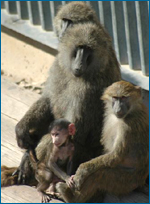
Ferreting out the genes that underlie a particular tooth ridge, though, is a challenge — and might be nearly impossible if Leslea had to deal with a population of wild baboons. Luckily, the baboons she works on are part of a unique colony developed by the Southwest National Primate Research Center in San Antonio, where they play a key role in scientific studies to find genes that influence human health. The primate center, which is part of the Southwest Foundation for Biomedical Research, documents the health, family histories, and genotypes of the baboons over many generations. Not only are the baboons well-cared for as they are studied over the course of their natural lives, but most importantly for Leslea’s studies, the baboons are entirely pedigreed — so there is a record of exactly how each baboon is related to every other baboon in the colony.
Knowing how the baboons are related allows Leslea to identify which aspects of tooth shape are genetically-controlled, and further, which traits might be encoded by the same gene. For tooth traits that are genetic, close relatives will resemble each other more than distant relatives. And tooth traits that always pop up together (e.g., a big bump on the first molar and a big bump on the second molar) are likely to be controlled by the same gene.
But figuring all that out requires manpower — to care for and keep track of the baboons, to make the thousands of careful measurements of the teeth themselves, and to run computer programs that crunch the numbers to identify patterns in the tooth measurements. For Leslea, that means collaboration: “That’s one of the things that I really like about this project — I couldn’t do it without Michael [Mahaney, a geneticist at the Southwest Foundation for Biomedical Research and Southwest National Primate Research Center] and Michael couldn’t do it without me. And there are other parts of it that you can’t do without other people — so it really is an interdisciplinary project because there’s just not time for one person to become an expert on everything…However, many of the people I collaborate with at the Southwest Foundation are trained in anthropology — so they’ve all got these evolutionary side interests — even though they are primarily focused on biomedical research.”

Get tips for using research profiles, like this one, with your students.
